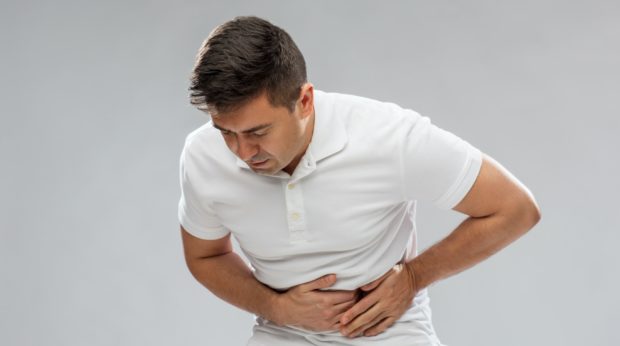Ulcerative proctitis is the inflammation of the lining in the inner wall of the rectum. Given that feces pass through the rectum to come out the organism, the evacuation act becomes painful for the patient. Besides, this kind of ulcerative colitis causes diarrhea, bleeding, secretion and the feeling of having the urgent need to go to the bathroom. All these symptoms can last a short time or, conversely, become chronic.
News
Ulcerative proctitis: What is it and how is it treated?
October 20, 2020
Patologies

There exist numerous causes1 for a person to suffer from ulcerative proctitis. The most frequent is to suffer an inflammatory bowel disease (IBD). But there are also other factors that may cause this condition. Some motives for suffering proctitis are sexually transmitted diseases, organism immunodeficiency, bacteria like Salmonella or antibiotics that destroy the gut flora. It may also be a side effect of radiotherapy used to treat prostate and rectal cancer.
What are the symptoms of the ulcerative proctitis?
The most frequent signs of ulcerative proctitis2 are constant urge to defecate, rectal bleeding or painful depositions. The mucus discharge of the rectum, the rectal or abdominal pain and diarrhea are also typical symptoms. If you experience any one of them, it is convenient for you to visit your physician.
In order to diagnose the disease, there are three ways to proceed. The first one is to run a proctoscopy (to examine the rectum cavity using a specific tube). It is possible to examine tissue samples with it in order to identify which bacteria, fungus or viruses are causing the proctitis. Another way of knowing if a patient is suffering from this condition is to make stool and blood tests. Lastly, it is also possible to look at some sections of the intestine using a colonoscopy. That helps detect Crohn’s disease as well as ulcerative colitis and, therefore, if that kind of colitis is a proctitis.
What is the appropriate treatment for the ulcerative proctitis?
The treatment3 for this disease depends on the cause of the inflammation. If the proctitis is caused by an infection, we will need drugs to cure it. They may be antibiotics, if it is a bacterial infection; or antivirals, if it has a viral origin.
Another possibility is for the condition to be caused by radiotherapy. If the proctitis is mild, it is unnecessary to start a treatment. If the pain is acute and the bleeding is severe, it is necessary to start a treatment, either take pills, suppositories or enemas. That serves to control the inflammation and reduce bleeding. Stool softeners and dilatation can also be used, both options help release fecal loading in the intestine. Finally, using a treatment to destroy the damaged tissue is another solution. Ending with the bleeding tissue will improve the symptoms of the proctitis.
If ulcerative proctitis is caused by an inflammatory bowel disease (IBD), the aim is to reduce the inflammation of the rectum. The treatments for that are anti-inflammatory or immunosuppressive drugs. If that does not work, the last option is to surgically remove the damaged section of the digestive system.
If this disease is not correctly treated, it is possible to develop a series of complications. The patient may suffer from anemia due to the chronic rectal bleeding. This results in dizziness, fatigue, shortness of breath, head ache or pale skin. Another consequence of not treating the proctitis successfully is the apparition of ulcers in the inner rectal lining. If those spread out to the whole bowel wall, it may generate fistulas.
The ulcerative proctitis is a type of ulcerative colitis. In particular, it is a chronic inflammatory disease that consists of the inflammation of the mucosa in a certain sections of the large intestine: the rectum. It is a portion of the digestive tube situated before the anus where the feces are contained prior to leaving the organism. For it to be considered ulcerative proctitis, the inflammation should not exceed 15 centimeters of the intestinal tube from the anal sphincter. Approximately, between 30 and 40% of patients with ulcerative colitis present this location. It is also fair to say that this form of ulcerative colitis is usually the mildest.
This inflammation makes it difficult for the stool to pass, therefore, the patient will, frequently, feel pain while defecating. This pain (rectal tenesmus: pain along with a feeling of not having adequately emptied the bowels, despite the repeated practice of evacuation) may be associated or not to the mucopurulent or even hemorrhagic (hematochezia) stool discharges. However, proctitis may also cause non-painful hemorrhages or the passage of mucus through the rectum.
A very common symptom of ulcerative proctitis is the continual urge to defecate (bowel-rectum movement). Another is tenderness and mild irritation in the rectum and anal region. Serious symptoms are pus and blood in the defecation, or cramps and pain during the bowel movement. All these symptoms can last a short time or, conversely, become chronic.
How is ulcerative proctitis diagnosed?
In order to diagnose the disease, there are three ways to proceed. The first one is to run a proctoscopy (to examine the rectum cavity using a specific tube). It is possible to examine tissue samples with it in order to identify which bacteria, fungus or viruses are causing the proctitis. Another way of knowing if a patient is suffering from this condition is to make stool and blood tests. Lastly, it is also possible to look at some sections of the intestine using a colonoscopy. That helps detect Crohn’s disease as well as ulcerative colitis and, therefore, if that kind of colitis is a proctitis.
A precise diagnose of this complication implies defining the severity of the inflammation. This information provides the basis for the selection of the most appropriate treatment and the prognosis of the patient. If this disease is not correctly treated, it is possible to develop a series of complications. The patient may suffer from anemia due to the chronic rectal bleeding. This results in dizziness, fatigue, shortness of breath, head ache or pale skin. Another consequence of not treating the proctitis successfully is the apparition of ulcers in the inner rectal lining. If those spread out to the whole bowel wall, it may generate fistulas.
What is the appropriate treatment for the ulcerative proctitis?
The ulcerative colitis is the most frequent cause of the ulcerative proctitis, but it is not the only one. There are other factors that may cause this condition. Some motives for suffering it are sexually transmitted diseases, organism immunodeficiency, bacteria like Salmonella or antibiotics that destroy the gut flora. It may also be a side effect of radiotherapy used to treat prostate and rectal cancer. The treatment for this disease depends on the cause of the inflammation.
If ulcerative proctitis is caused by an inflammatory bowel disease (IBD), the aim is to reduce the inflammation of the rectum. The treatments1 for that are anti-inflammatory or immunosuppressive drugs. If that does not work, the last option is to surgically remove the damaged section of the digestive system.
If the proctitis is caused by an infection, we will need drugs to cure it. They may be antibiotics, if it is a bacterial infection; or antivirals, if it has a viral origin. Another possibility is for the condition to be caused by radiotherapy. If the proctitis is mild, it is unnecessary to start a treatment. If the pain is acute and the bleeding is severe, it is necessary to start a treatment, either to take pills, suppositories or enemas. That serves to control the inflammation and reduce bleeding. Stool softeners and dilatation can also be used, both options help release fecal loading in the intestine. Finally, using a treatment to destroy the damaged tissue is another solution. Ending with the bleeding tissue will improve the symptoms of the proctitis.
Contact UsFor more information
Contact Us
